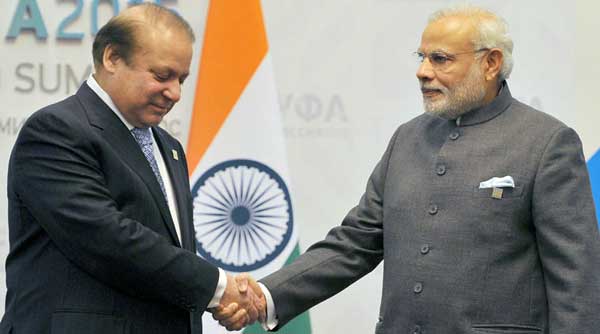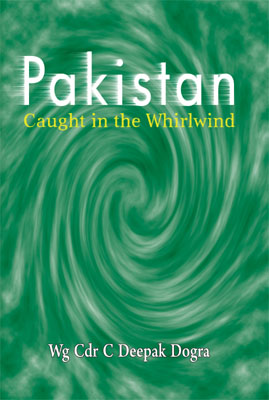The world is concerned as relations between two nuclear powers, i.e., India and Pakistan, are deteriorating. Pakistan, which has launched a low-intensity war against India, constantly infiltrates terrorists into India and threatens to use nuclear warheads if a war occurs. Pakistan, which was created on the basis of a two nation theory, still harbours enmity and suspicion against India. The civilian government of Pakistan may like to have friendly relations with India, but the all-powerful Pakistani army, which survives on the hypothesis of danger from India, does not allow the civilian government to have cordial relations.
There are several outstanding issues between both countries, and it is very difficult to sort them out in one go. Nonetheless, both countries should make sincere efforts first to resolve less important issues and then slowly to try to sort out major issues, including the Kashmir problem. All issues can be sorted out bilaterally without interference of any other country, including the United Nations. There is a need to start negotiations and enhance direct trade between India and Pakistan. Pakistan should also understand that India is powerful and no other country will come to help in case of war and the next war may be catastrophic for its existence.
Ajit Doval, the present NSA, collected convincing evidence about creepy ISI involvement in the flaring-up terrorism in India. The recent arrest of two Pakistani terrorists has made India’s case strong.
Deep-Rooted Suspicion and Anti-India Activities
The inhabitants of both countries view each other with great suspicion and distrust. According to a poll conducted by a news agency in 2013, only 11 per cent of Indians and 19 per cent of Pakistanis view each other’s influence as positive.
Pakistan, which has emerged as a focal point of terrorism, alleges that India funds the Muttahida Quami Movement (MQM), which is dominant in Karachi, Sukkur and Hyderabad and creates violence in these cities, especially in Karachi, at the behest of India.
Pakistan, which trains terrorists and sends them regularly to India to carry out terrorist activities, charges that India is also supporting separatist elements in Baluchistan.
Indian security forces caught three Pakistani nationals of Lashkare- Taiba alive in three different terrorist incidents: Ajmal Kasab, Mohammed Naveed Yakub and Sajjad Ahmad. All these terrorists mentioned during interrogation that they were trained in the camps run by the nefarious ISI or terrorist outfits controlled by the ISI.
The cancellation of national security advisers’ (NSAs’) meeting in August 2015 by the Nawaz government under undue pressure from the Pakistani army is unfortunate. Nawaz and Modi at Ufa, Russia, decided that the NSAs would discuss terrorism. Hence the insistence later that the NSA talks must include Kashmir, Siachen, Sir Creek, etc., clearly indicated that Pakistan wanted to sabotage the talks.
The Pakistani army, including the despicable ISI and the various terrorist outfits sponsored by them, do not want cordial relations with India … They understand that their significance lies in anti-India rhetoric.
Pakistani high commissioner Abdul Basit and NSA Sartaj Aziz were adamant that they would meet leaders of All Parties Hurriyat Conference during Aziz’s visit to India, which was mischievous. It is a different issue that the Hurriyat leaders have no following and they have lost their credibility even in the valley.
The decision of the Modi government that neither would they meet the Kashmiri separatists nor will they allow the Pakistanis to meet them is the right decision, and the government of India must adhere to it.
Ajit Doval, the present NSA, is an old Intelligence Bureau hand who was also posted in Islamabad. He collected convincing evidence about creepy ISI involvement in the flaring-up terrorism in India. The recent arrest of two Pakistani terrorists has made India’s case strong.
India has also made a dossier about Dawood Ibrahim in which India gave his latest photograph, details of his more than one passport and particulars of his properties in Pakistan, including Karachi, which has made India’s case stronger.
The government of United Arab Emirates started seizure of the properties of Dawood Ibrahim as a fallout of the recent visit of the Indian prime minister.
The Pakistani army, including the despicable ISI and the various terrorist outfits sponsored by them, also do not want cordial relations with India because firstly they want to capture Jammu & Kashmir (J&K) and secondly the Pakistani defence establishment and the terrorist outfits supported by them would lose importance. They understand that their significance lies in anti-India rhetoric. There is also an important segment of Pakistani society as well as of the defence establishment that falsely proclaims that hardliners in India do not accept the partition and want to disintegrate Pakistan and then merge it into India. They cite the examples of the creation of Bangladesh as well as the amalgamation of Sikkim into India.
Unfortunately, fundamentalism has grown so much in Pakistan that several Pakistani defence personnel genuinely believe that through jihad, they can impose the domination of Islam in South Asia.
Low-Intensity War Waged by Pakistan
Pakistan has waged a low-intensity war against India. The security agencies of India have collected undeniable data pertaining to the involvement of the ISI in infiltrating terrorists into India. Besides this, Pakistani nationals caught while carrying out terrorist activities have given full details about the training and funding, the supply of arms and ammunition, the assistance in border crossing, and the names and ranks of the ISI officers imparting the training.
In 2009, the then Pakistani president Asif Zardari also accepted that Pakistan assisted terrorist outfits to fulfil its geostrategic aspirations. The infallible details given by India were also accepted by several countries, including the United States and the United Kingdom.
Terrorists of several countries, including Pakistan, have taken refuge in Federally Administered Tribal Areas (FATA). The ISI, as well as terrorist outfits sponsored by the ISI, is running training camps in the area. In these training camps, serving and retired army officers impart training. These trained terrorists carry out terrorist activities in several countries, including India, Afghanistan, Russia, China and Israel and even in Western countries.
Unfortunately, fundamentalism has grown so much in Pakistan that several Pakistani defence personnel genuinely believe that through jihad, they can impose the domination of Islam in South Asia.
The ISI assists several terrorist groups, including al-Qaeda, Jaishe- Mohammad, Lashkar-e-Omar, Lashkar-e-Taiba, Jamaat-ud-Dawa, Sipahe- Sahaba and the Haqqani Network. Besides this, the ISI has also created the Indian Mujahideen (IM), which is a group of misguided Indian Muslims who carry out terrorist activities in India at the behest of the ISI. These young Indians are sent to Pakistan through Middle Eastern countries for training jn terrorism. In the training, maulvis (preachers) regularly preach to them about jihad and Islam in such a way that the trainees become fanatics.
Hate speeches by Pakistani and some Indian leaders and selfish interests of various pressure groups make it abundantly clear that the probability of long-term peace between the two neighbours is very remote.
The Pakistani spy agency has also created Brigade 313 to carry out terrorist activities across India, especially in J&K. The ISI selected this name to give a religious fervour to Islamic extremists as 313 soldiers under Prophet Mohammed defeated a much larger army. The dreadful Brigade 313 has terrorists from various terrorist outfits, including Lashkare- Taiba and Jaish-e-Mohammad. However, now, a faction of Brigade 313 opposed to the policies of the ISI has started carrying out terrorist acts within Pakistan also.
There is conclusive evidence that the ISI has helped Naga insurgents, Naxalite outfits, the United Liberation Front of Asom (ULFA), insurgent groups of the Khalistani movement, etc.
Pakistan, instead of curbing assistance to various terrorist outfits, alleges that India is helping secessionist movements in Pakistan, including Baluchistan.
The Way Ahead
The leaders of both countries have met several times, goodwill visits were exchanged, umpteen numbers of meetings between the foreign ministers/foreign secretaries were held and several confidence-building measures were introduced, but the differences and mistrust between India and Pakistan could not be mitigated. Hate speeches by Pakistani and some Indian leaders and selfish interests of various pressure groups make it abundantly clear that the probability of long-term peace between the two neighbours is very remote. Both parties understand that Pakistan was created after a gory partition and since then, enmity between both countries has never lessened.
The meeting between the NSAs of both countries was cancelled at the behest of Pakistan. Hence India could not give the dossiers to the Pakistani NSA. Now Indian diplomatic missions abroad should launch a campaign with all the facts and figures to prove that Pakistan is sponsoring terrorism in the region, especially in India and Afghanistan. India should also try to take the help of Afghanistan in this regard to convince the world that Pakistan should be declared a terrorist state and strict sanctions need to be imposed.
India, which has emerged as the largest importer of arms and ammunition, should also try to take the help of countries exporting defence armaments to India, especially the United States, France, etc., in its diplomatic offensive against Pakistan and should try to impose severe sanctions against it.







hahahhah